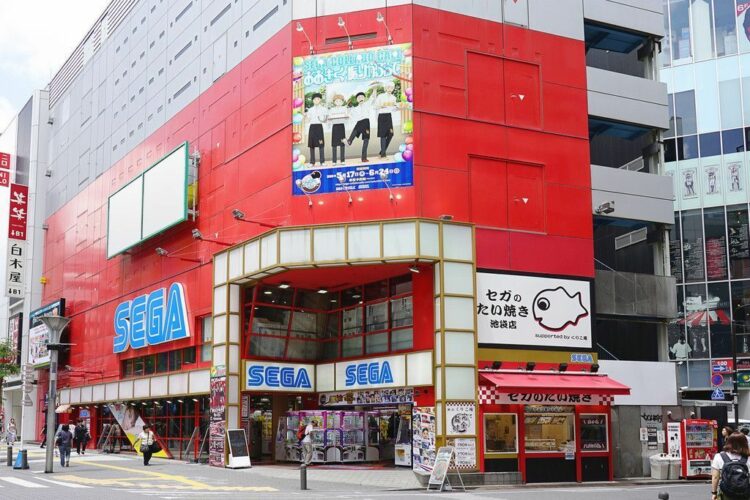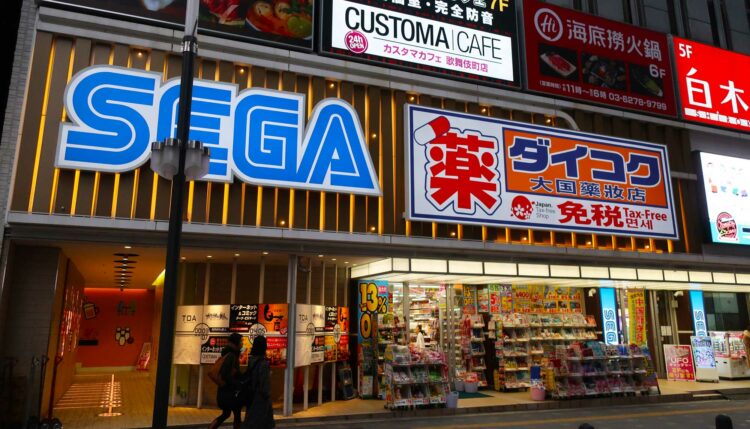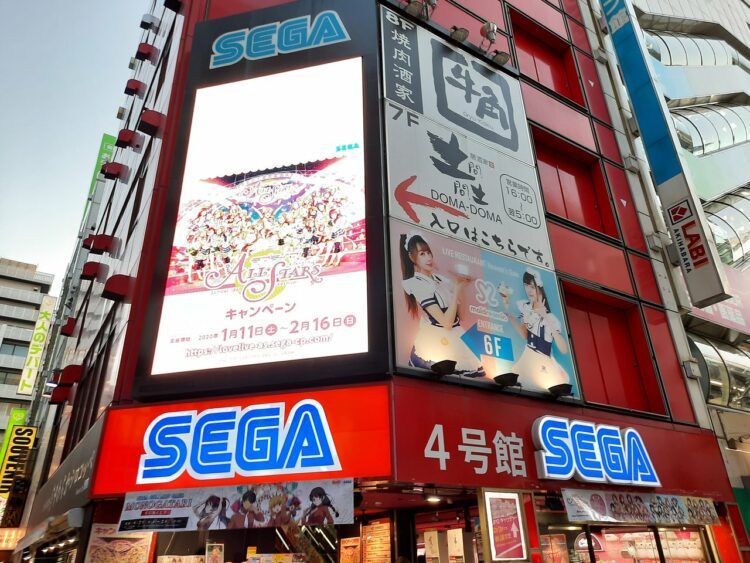As you know that the arcade business has been shrinking over the last few decades. This was one of the main reasons Yu Suzuki left SEGA in 2008, stating that they would no longer fund larger scale arcade games. As time went on, it seemed that only a handful of arcade titles continued to profit and the market kept shrinking. This year we got hit with Covid-19, which had a huge impact on the arcade market.
Because of these trends and the events of 2020. SEGA has sold off a majority stake (85.1%) of their SEGA Entertainment arcade business to GENDA, “a company created in 2018 by former President of Aeon Fantasy. Genda specialises in the rental of amusement machines and owns the LIFTる。website and mobile application which allows players to remotely play cranes and have their won prizes delivered home” (Source: Arcade Belgium). SEGA is now a minority shareholder of the business at 14.9%.
SEGA Entertainment has 199 Entertainment facilities, 193 of those are arcade centers. What is seen as a shocking development, but probably one long overdue, will no doubt be seen as the end of an era but it does not mean SEGA is leaving the arcade business. SEGA will continue to develop and manufacture arcade games, as that division is still 100% owned by the SEGA Corporation and is separate from SEGA Entertainment. SEGA will continue to make arcade games, this news just means they won’t be managing the arcade buildings. SEGA has also said, via Famitsu, that SEGA will continue to develop arcade titles, but will shift some of its arcade development staff to the console business.
Also, the arcades will keep the SEGA branding. This is similar to how GameWorks began as an extension of the DreamWorks brand, and after exchanging hands of several different owners (including SEGA) the name still remained.
In order to balance the books, the company will be reviewing the balance sheet for non business properties, build a new structure to adapt to changes in the market because of COVID and reduce costs group wide by 15 billion yen ($144 million) before the end of the fiscal year. While SEGA did say that the market was picking up slightly, without knowing which way COVID-19 will continue to effect Japan, this was the best course of action for them.
Genda themselves seem to be an ambitious up and coming company that looks like they can re-energise SEGA’s stagnent amusement centre operations. Genda also has operations in China and the United States, so this will make them one of the big arcade players in the world. The price Genda paid for SEGA Entertainment was not disclosed.
Having covered SEGA Entertainment for the best part of a decade, this was always one trouble spot for the company that never seemed to be worth the investment. While having direct access to arcade players was a huge boost in the 80s and 90s, as gamers have began moving away from arcades to home console and mobile, it seemed like a bad idea to operate both selling of your own machine and leasing out space for people to play your machines. Hopefully this means SEGA can now reallocate resources to other sectors, such as the amusement sales division proper and consumer software.
What do you guys think of all this? While it is mostly a Japanese thing, SEGA’s arcade business has been part of its history almost since the start and having them sell off 85% of the shares on the companies 60th Anniversary is a bitter pill to swallow. It also makes you think what will happen with SEGA’s FOG Gaming announcement they talked about earlier this summer.
While we’ll no doubt see more cost cutting measures from SEGA in response to Covid-19, another division to keep an eye on is their resort business. With tourism way down, owning large scale hotel operations maybe the next on the chopping block. Also worth noting, SEGA Sammy Holdings also sold 37% of its shares held in Sanrio, making them no longer a majority shareholder with 6.68% now remaining. As for the future of more arcade games? Expect to see the continued development of titles such as KanColle, Mai Mai which continue to be extremely profitable for SEGA.
[Additional article contributions from Aki-At and Barry]






This is potentially the biggest loss for Sega in its entire history, yes bigger than suspending home console R&D in 2001 (as they were all just based on Sega arcade consoles anyway but downgraded variations for the home market to transfer arcade conversions for the home) and bigger than the Sammy merger in 2004.
Sega was a fairly arcade focussed company from its very origins, it exuded this same mentality in how it made software games, games like Sonic and Nights are clearly arcade style titles, so now Sega has just basically sold nearly its entire arcade business away leaves the qusstion of heat is to become of them now? From a once proud pedigree healthy powerhouse in the industry to now a mere bit player mobile company?
What else do they have really aside from a few reliable IPs like Sonic and Yakuza, they will probably no doubt transition entirely to an entirely software only house now as a small company within Sammy, so yes, Sega didnt entirely leave hardware in 2001, they merely suspended home hardware, not all hardware, that’s why there core hardware was always arcade consoles that they continued after the Dreamcast, like the Sega Naomi 2, Sega Chihiro, the Hikaru, the Sega Lindhberg, the Ringed and Nu as well as Ringwood and Sega Cyclone ect, but the Dreamcast was of course the last Sega home console based on a Sega arcade console, the Sega Naomi.
I don’t think you really understood the article. It refers to SEGA Entertainment, which handles the physical spaces where people go to play their arcade machines. It doesn’t affect SEGA Interactive (which handles arcade machines themselves and creation of arcade games) at all. They’re just leaving another company to handle those physical spaces, but it basically changes nothing in the eyes of consumers, as the buildings will even keep the SEGA branding.
I see this as more of an exit from the real estate business than from the business of developing games. Expect to see a collapse in the commercial real estate market in general in 2021. The sad and stunning fact is that there are going to be very long-lasting changes to society due to COVID-19.
Maybe SEGA is just masterminding this by forecasting the huge eventual slump of real estate next year that’s on the way and is selling it’s properties off at a premium to later buy new ones for dirt cheap when the prices drop right down.
Not sure how that would work with their recent Fog technology as that doesn’t gell with this mastermind strategy, if it is a strategy in the first place that is, rather than just a late reaction to market forces.
How does Fog even work, this was supposed to be the biggest news for Sega this year, and now a couple of months later they are getting ready to dispense with the territories that would house it as well as nearly their entire arcade business?
I agree with this reading of the news. I have worked in an industry (education) that relies not only on developing programs and employing educators, but also managing real estate (campus locations) and even having to hit numbers on student housing. Guess what aspect of the business was a struggle and usually a strain on finances? That’s right, maintaining real estate and hitting those student housing numbers. I am sad SEGA is leaving this aspect of their history behind, but if I am to be a realist this was probably a financial burden on them AND does not really contribute to their mission to create new entertainment experiences outside of managing a building to hold the games from their arcade division.
So basically this is the end of Sega as we know it, as in the old Sega?
Almost symbolic with how they decided to just abandon their old HQ in Haneda for a Sega-Sammy themed building instead of just a seperate Sega building HQ like the good old days.
And now it seems they are going to abandon all seperate Sega themed buildings in general that were huge landmarks there
No, they still have the arcade development arm and the home console teams, as well as many other arms of SEGA SAMMY.
So is Joypolis the last stand now?
This news seems to point to GENDA managing Joypolis. To guests, there might be minimal differences to the experience. But the staff and resources are now managed by GENDA. I suspect higher level executives will be let go or moved to other parts of SEGA SAMMY or shifted to GENDA. Lower level employees, such as those working with customers, are likely to remain working but as GENDA employees.
Though the arcade business has been an important cornerstone for SEGA through the years, I see this as a smart, responsible decision for the company. I am surprised that this did not happen sooner given the trajectory of arcade gaming, though understandably, the Japanese arcade scene continues to be much stronger than what it is in the United States. I am glad that SEGA’s nostalgic logo will remain on the buildings after the acquisition. I hope that with these new cost-saving measures, SEGA will remain laser-focused on their home console/PC game development, especially since they are allocating manpower to that area of R&D.
People said the same thing about Sega when they decided to suspend Dreamcast development after March 2001, same arguments, “Sega will remain later focussed on AAA software now”, “Sega no longer held back by restrictive single hardware platform restrictions like Nintendo and Sony”, “Sega will dominate the games industry and own at least 25% of the industry” etc etc, didn’t exactly pan out that way though as of yet anyway.
Maybe it’s time to leave sammy. In reality even tho sega holds the brand. Pachinkoand arcade is sammy. And he rest is sega. Sega is pretry dem good. Where sammy used to safe sega. Today sega needs to safe sammy. Its time to either help sammy out or seperate to stay safe
Sega Sammy has not sold 37% of Sanrio’s shares. They had only 11% for a few years. They have sold shares before. Now Sega has only 7.09% and is still the second largest shareholder.